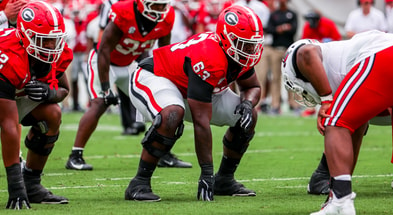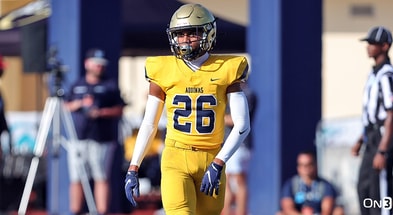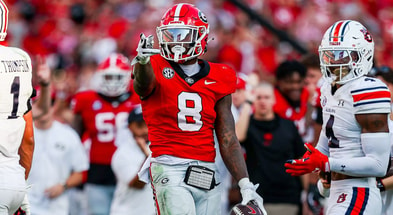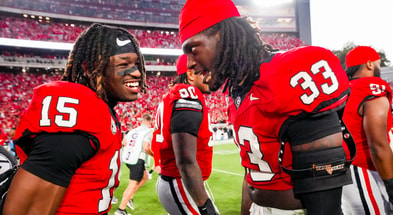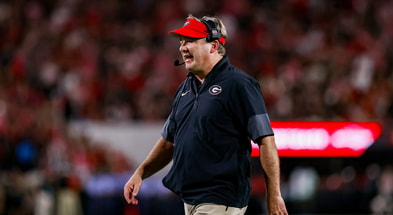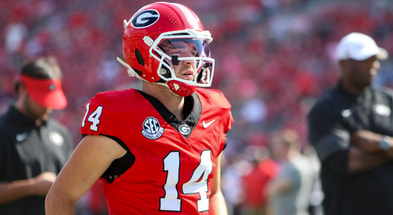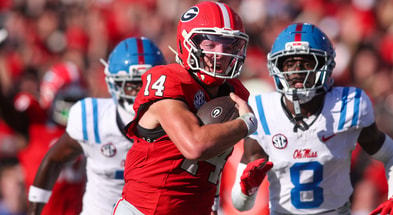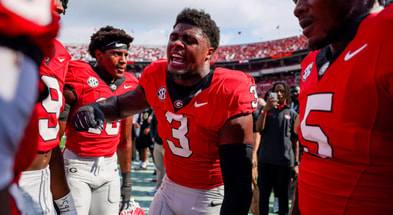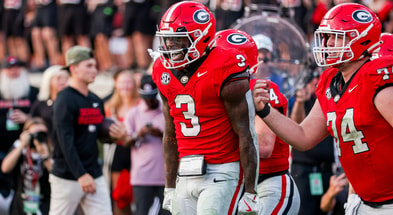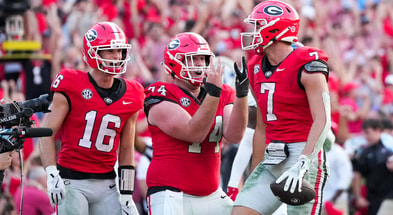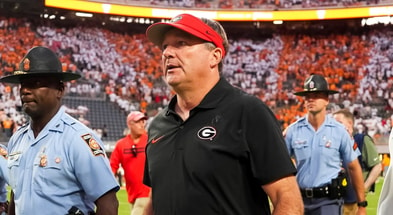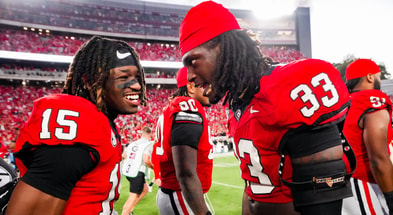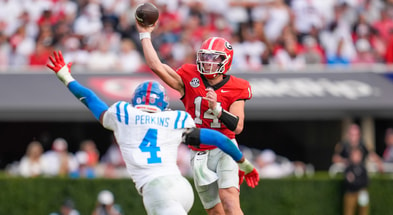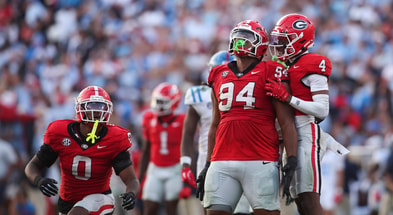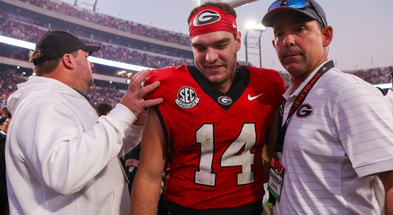Georgia's odd case of the slow starts and how Kirby Smart sees it

ATHENS, Ga. — Top-ranked Georgia has a reputation starting to form. While the Bulldogs are 3-0 and have won each of their three outings by double-digits, slow starts seem to be holding them back from reaching their full potential.
Though three games, the Bulldogs are averaging just 3.33 points per first quarter. They scored a touchdown in the opener, were shut out in their second game and most recently put up only a field goal.
Compare that to previous seasons and just twice before has a Kirby Smart-coached team averaged less than a touchdown in the first quarter. That came in his first season (2016 – 5.85 points per first quarter) and with a 2019 unit that fans would rather forget (6.21 points per first quarter).
The odd part about all this is, Georgia gets it going eventually. Of course the sample size is small and the opponents haven’t been of the highest caliber, but the Bulldogs’ average of 39.0 points per game would rank second among scoring offenses under Smart.
That’s part of the reason why Smart isn’t all too concerned about his team’s low-scoring first quarters. In fact, he doesn’t see it as a “slow starting” issue at all. In his eyes, the problem has been execution in the red zone as opposed to struggling to get going.
Red Zone Woes Related to Slow Starts
After Georgia’s scoreless first quarter against Ball State, Smart pointed to the fact that they drove down the field and had one play with failed execution. That led to a field goal attempt and a missed kick from Peyton Woodring.
This past week against South Carolina, it was largely a matter of possessions – or lack thereof – that prevented Georgia from scoring. The Gamecocks received the opening kickoff and took over 5:00 off the clock, driving 65 yards in 10 plays for the touchdown. Then, the UGA drive was 15 plays and almost 8:00 long, getting inside the South Carolina 15-yard-line and as far as the SC-8, stalling for a field goal.
“Really our first half issues revolved around our defense first possession would be the biggest thing. I think you gotta start fast,” Smart said. “I think historically, defensively, somebody can do the study, but we usually start pretty fast on defense. The Georgia Tech game I know that was the first possession of a game that we gave up a touchdown, last year. That happened third game this year on a team that had — did a good job, came in, got on rhythm. There’s still things we did, like are we talking about this if we tackle him on 3rd and 15? I don’t know.”
“I mean at the end of the day, the difference in the first half was red area play both ways,” he added. “Things we can improve on, you have to be able to run the ball in the red area, and you have to be able to stop the run. We did not — we let somebody run the ball in on us on defense, which is a no-no at Georgia. And we didn’t — we didn’t have positive 1st and 10 plays in the red area on offense, which that gets you in trouble, too, because you usually have four downs down there to go for it, but you can’t do that if you’re 4th and 10. If you’re 4th and 1 or 2 or 3, you can. So we gotta have positive plays both ways to get better. We certainly have to improve in that area.”
Looking at that stats for that area this season, Georgia is converting 81.25% of trips to the red zone into scores, but only nine of the 16 (56.25%) trips have ended in touchdowns. Just as we did with first quarter scoring, compare that to previous seasons and the only one worse is 2016. That team found the end zone from the red zone just 55.56% of the time.
For reference, last year’s team did so at a 68.67% clip, good for second-best in the Smart era behind the 2017 team – not coincidentally the only other one to win an SEC Championship. However, even the 2022 team had days that it struggled to punch it in close to the goal line. Against Samford, just three of eight trips ended in touchdowns. They were 50% or worse five times on the season in total (Samford – 3/7, Auburn – 3/6, Missouri – 2/5, Tennessee – 2/4, Kentucky – 1/4).
Top 10
- 1New
SEC ref suspended
New details emerge
- 2Hot
CFB's most-watched teams
SEC flexes in Top 10
- 3Trending
ESPN blackout looms
YouTubeTV standoff
- 4
College GameDay
Newest guest picker revealed
- 5
CFB General Managers
Top 25 highest paid
Get the Daily On3 Newsletter in your inbox every morning
By clicking "Subscribe to Newsletter", I agree to On3's Privacy Notice, Terms, and use of my personal information described therein.
Furthermore, the 2021 National Championship winning team also went through a phase of slow starts, being held scoreless in two straight first quarters and with just a field goal in the one prior midseason. For a stretch of five game, that Georgia team was held to a touchdown or less in the first 15:00. However, that wasn’t related to red zone woes, only once posting a touchdown rate inside the 20 less than 60% in that stretch.
Clock Changes Causing Trouble
There’s also the clock change factor to it all. Georgia – not alone in this – is getting less possessions in the first quarter of games because there is no stopping of the clock for first downs as there had been in the past. While plays are only down about three per team over the course of an entire game, Smart said it feels like it’s been more than that with the possession deficit – especially if you start the game on defense.
“They played with pace. For them to play with pace, it’s a long drive. We’ve got to get off the field,” Smart said in reference to South Carolina when asked if he felt the affect of the new clock rules in the first quarter. “I told (the team), ‘Look, we’re going to get six possessions in the second half.’ I don’t know how many we ended up getting, but told them we were going to get six possessions and we’re going to have to score on four out of six. We’re going to win one moment at a time and go out and do it over and over again. Outside of the possessions that ended in field goals in the second half that we missed, I thought we did really well with the possessions.”
“It seems less, it seems faster, but I don’t know what impact it has had,” Smart added in a conversation with reporters on the clock rules this week. “If you look at it by number of plays, then that’s minimal. I mean, that’s just minimal. Three plays per game? I mean three plays per game per team? I don’t think that’s a major deal. Possessions matter, but I can’t sit here and tell you the possessions because I didn’t ask for that number. If three plays are down, then it shouldn’t be possessions down.”
What It All Means
Enough of the numbers. What does all this mean? It means that Georgia must find a way – whatever way necessary – to execute better early in games. Carson Beck said in his postgame interview Saturday that he felt sure it’d be a point of emphasis this week at practice. Smart shared that they’ve done some things different to try and find a spark.
“We change up practice a lot. We changed it up last week, changed it up some this week in terms of what order we do different things,” Smart said on the SEC coaches teleconference. “Again, the slow starting has been identified by you guys. For me, it’s slow scoring, not slow starting. But that’s been the case in terms of just not putting the points on the board. We took the ball and drove down and did good things, had a great opening possession last week, just not getting the results from it. So it’s a combination of a lot of things but it’s not necessarily slow starting.”
“I’m really thinking about UAB, so I’m trying to keep you guys happy and appease you, but I’m very pleased with where things are. I’m not panicking in any kind of way,” Smart said in summary of it all. “South Carolina has a good team, and we’re figuring out who we are. We’re figuring out who we are with our identity, and I think our coaching staff and players and complete organization are doing a great job. You guys just aren’t happy with the results. But I’m very happy with the way our guys fought back and came back and overcame.”



